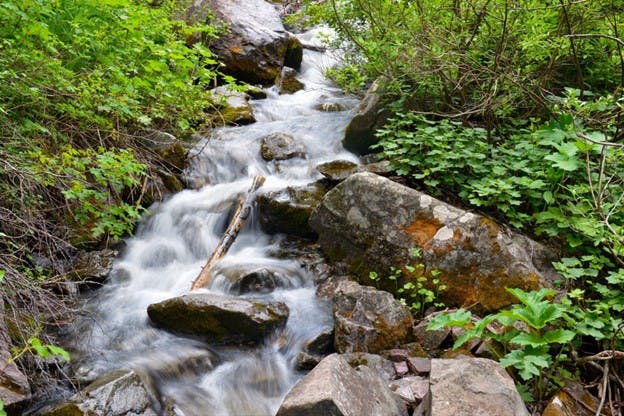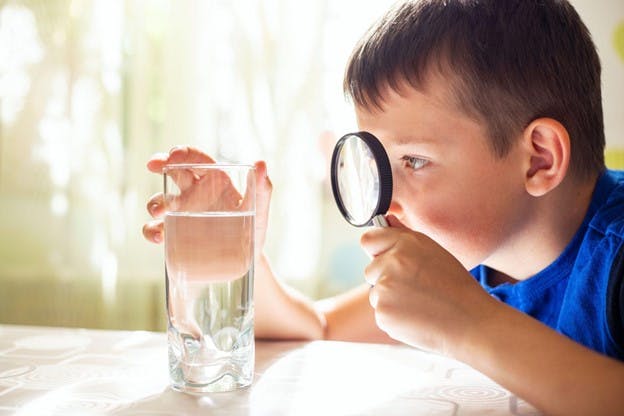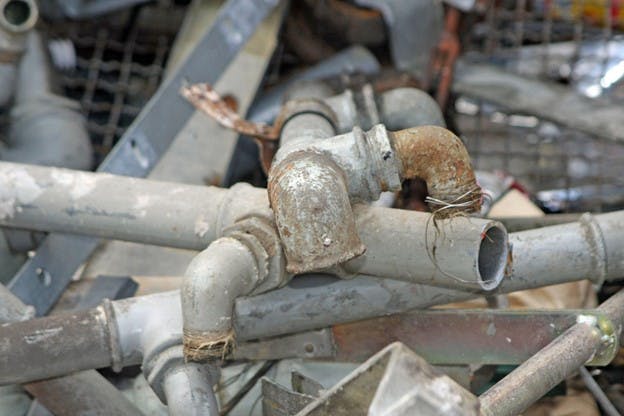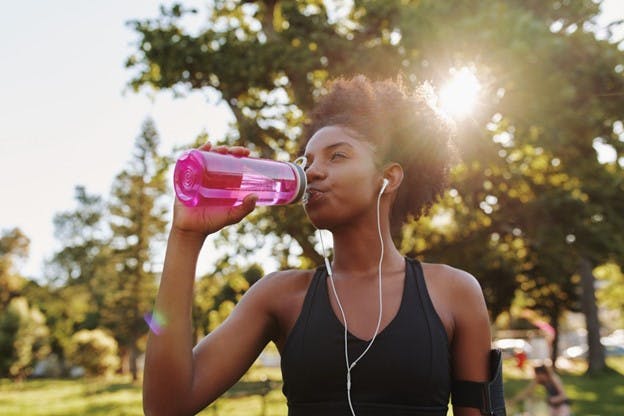May 2023
Are Denver’s Water Quality Standards a Mile High?
Sitting at the foothills of the Rocky Mountains, Denver is beautiful and full of life. With just over 700,000 people calling the Mile High City home, it’s the largest city in the state of Colorado and serves as a hub for business, tourism, and outdoor recreation. Denver is consistently ranked as one of the most physically active cities in the United States, with the American Fitness Index naming it the fourth fittest city in the country.
The city’s celebration of life and dedication to an active lifestyle can be found everywhere you look. Denver has a walkable downtown, over 20,000 acres of parks, and six professional sports teams, and it prioritizes sustainability and locally farmed foods. Although far from good, Denver has even made big strides with its air pollution issues over the past 50 years. But what about its water?
Getting enough fresh, clean water is one of the most important parts of a healthy lifestyle, and we want to know if this emphasis on health extends to the water that comes out of each Denverite’s tap.
Follow along as we go through the good and the bad of Denver water quality to better understand what, if anything, you should be doing to protect yourself.
Where Does Denver Get Its Drinking Water From?
Unlike most U.S. cities that get their water from underground aquifers, Denver gets its water from 100% surface water sources like lakes, streams, and reservoirs. There are over 3,100 square miles of watershed, all fed by Rocky Mountain snowmelt.
The main sources are the South Platte River, the Dillon Reservoir, and the Fraser River. The water is then collected and stored by Denver Water inside mountain reservoirs. These include the Antero, Cheesman, Gross, Eleven Mile Canyon, and Dillon.
From there the water is transported to the city through over 4,000 miles of natural streams and a man-made pipe system, where it is treated and stored underground before eventually being pumped out and used by 1.5 million people in the greater Denver area.
How Is Denver Water Quality?
Denver’s water system is huge and complex. The natural formations and man-made innovations work together to transport water thousands of miles from the high mountains to your kitchen sink. While this distribution system is a modern marvel, its sheer size can make it hard to control the water quality.
The landscape of the Rocky Mountains can trap air pollution so that it lingers in the region, while industrial spills thousands of miles away have to be quickly managed by water providers. These issues can be compounded by the aging infrastructure that can allow sewage leaks and lead contamination into the water supply.
Is Denver Tap Water Safe To Drink?
In 1974, the Safe Drinking Water Act was passed, requiring all U.S. public water suppliers to adhere to minimum safety standards for drinking water.
These standards are laid out and governed by the U.S. Environmental Protection Agency (EPA) but can be strengthened further by state regulators. Each water provider is required to put out an annual consumer confidence report (also known as a water quality report) informing residents of the status of their water.
According to the standards set by the EPA and the Colorado Department of Public Health and Environment, Denver’s water is considered safe to drink.
Denver Water tests its water for regulated contaminants often — in 2021, it conducted about 200,000 tests. The water treatment plants can adjust their treatment process based on these test results.
While Denver Water also tests for additional secondary contaminants like PFAS, which have been a subject of concern recently, there are thousands of potential water pollutants that are not regulated or may be underregulated. Many contaminants aren’t yet known about or can’t reliably be tested for with current technology.
The D.C.-based water watchdog group the Environmental Working Group (EWG) makes it their mission to encourage stronger water safety regulations that are more in line with current science. They point out that the EPA hasn’t updated their regulations in almost 20 years, even as our understanding of many contaminants has evolved.
The concentration of many contaminants affecting Denver water quality can be hundreds of times higher than current science recommends and still be within legal limits. In Denver’s water, disinfection byproducts, lead, radium, and arsenic are the biggest problems.
What Contaminants Are in Denver Water?
All drinking water is reasonably expected to have some contaminants. Denver water starts life in the mountains and travels through miles of rivers and then pipes. It should be expected to pick up minerals, metals, pathogens, and other impurities along the way. However, these are a few of the more problematic contaminants, according to the EWG:
Haloacetic Acids (HAA5)
HAA5 is made up of five haloacetic acids: monochloroacetic acid, dichloroacetic acid, trichloroacetic acid, monobromoacetic acid, and dibromoacetic acid. These chemicals are known as disinfectant byproducts, as they result from disinfectants like chlorine interacting with organic matter in water. Long-term exposure to HAA5 can lead to cancer.
Levels of HAA5 in Denver water have exceeded what the EWG recommends for safety by 142 times.
- EPA maximum allowance: 60 parts per billion (ppb)
- EWG recommended maximum: 0.1 ppb
- Denver maximum contaminant level: 14.2 ppb
Haloacetic Acids (HAA9)
HAA9 includes all of the contaminants from HAA5 but adds bromochloroacetic acid, bromodichloroacetic acid, chlorodibromoacetic acid, and tribromoacetic acid. These are also disinfectant byproducts and are also cancer-causing.
Levels of HAA9 in Denver water have exceeded what the EWG recommends for safety by 246 times.
- EPA maximum allowance: No legal limit
- EWG recommended maximum: 0.06 ppb
- Denver maximum contaminant level: 14.7 ppb
Total Trihalomethanes (TTHMs)
TTHMs — like the haloacetic acids above — are formed when chlorine interacts with organic compounds in drinking water. They’re also known to be carcinogenic. This category is made up of four chemicals: chloroform, bromodichloromethane, dibromochloromethane, and bromoform.
Levels of TTHMs in Denver water have exceeded what the EWG recommends for safety by 153 times.
- EPA maximum allowance: 80 ppb
- EWG recommended maximum: 0.15 ppb
- Denver maximum contaminant level: 23 ppb
Arsenic
Arsenic is carcinogenic and is known to cause damage to the brain, central nervous system, skin, and blood vessels. Arsenic is a common contaminant in U.S. public drinking water because it can occur naturally in groundwater.
Arsenic levels in Denver water have exceeded what the EWG recommends for safety by 6.8 times.
- EPA maximum allowance: 10 ppb
- EWG recommended maximum: 0.004 ppb
- Denver maximum detected level: 0.0273 ppb
Radium
Radium is a radioactive heavy metal found both in nature and as a byproduct of oil and gas production. Radium is a known carcinogen. Legal limits for radium are measured in picocuries per liter (pCi/L), which is a measure of radioactivity.
Radium levels in Denver water have exceeded what the EWG recommends for safety by 6.7 times.
- EPA maximum allowance: 5 pCi/L
- EWG recommended maximum: 0.05 pCi/L
- Denver maximum detected level: 0.33 pCi/L
Does Denver’s Water Have Lead in It?
When water leaves the treatment plants in Denver, it is free of lead. However, once that water reaches your faucet it could have a dangerous lead level. A lot of the water infrastructure in Denver was installed during a time when lead pipes were the norm, and we didn’t know the health risks. Most houses built in Denver before 1951 have water service lines which can leach lead into your water.
To combat this Denver water quality problem concerning lead, the water utility launched the Lead Reduction Program in 2020. This is a five-step program that includes changing the pH to lessen lead pipe corrosion, public mapping customer-owned lead service lines, public outreach, free water pitcher filters, and a 15-year program to completely replace the lead plumbing in customer homes.
According to the EPA, there are no safe levels of lead in water, especially if you have children or pregnant women in your home. Lead accumulates in your body and is persistent. In children and fetuses, small amounts can cause severe damage to the nervous system. Lead can cause learning disabilities and behavioral changes, stunt growth, damage hearing, and impair blood cells from forming and properly functioning.
If you have lead in your plumbing or service line, it’s highly recommended that you protect yourself and your family with a point-of-use water filter instead of a point-of-entry filtration system.
A point-of-use filter is installed at the faucet level so the last thing the water touches as it comes out is the filter. In a point-of-entry system, the water is filtered before it enters your home plumbing. If your plumbing is the source of your lead problem, filtering it before it touches your plumbing would not protect you.
HomeWater’s 4-Stage Reverse Osmosis Under Counter Water Filters remove lead and other contaminants like disinfection byproducts, fluoride, and arsenic.
Does Denver Add Fluoride to Tap Water?
Yes. Like many modern western water utilities, Denver Water fluoridates tap water as part of its treatment process. Fluoride is added to treated water as a public health measure to help prevent cavities.
While some people want fluoride in their water, others would rather remove it. If you’d like to remove fluoride from your drinking water, the best way to do that is with a reverse osmosis water filtration system like the one mentioned above. Most other types of filtration methods do not remove fluoride.
Does Denver Have Hard Water?
Hard water occurs when there is a high concentration of mineral solids in your water. This often happens in groundwater sources. Denver’s water is 100% surface water sources and is considered soft to moderately hard, depending on where you are in the city.
If you have an issue with hard water causing soap scum or leaving behind white crusty stuff on your fixtures and surfaces, a water softener or salt-free water conditioner will solve your problem.
How to Get Top Quality Water in Your Denver Home
Denver is home to some of the most active people in the country, and they rely on Denver water quality to keep them going. If you have concerns about your water in Denver, or you just want the best-tasting water imaginable, HomeWater can help.
HomeWater has several affordable, American-made water filter options for Denver residents. Our 4-Stage Reverse Osmosis Under Counter Water Filter is perfect for removing lead, disinfection byproducts, fluoride, chlorine, bacteria, and more from the water that comes out of your kitchen faucet.
On the other hand, if you want great-tasting, pure water to pour from every tap, shower, and water-using appliance you own, HomeWater’s 4-Stage Whole Home Filter will protect your entire home for over 1 million gallons of use. Add on a water softener and rid your life of soap scum for good, too.
Let HomeWater make your water the best it can be.



